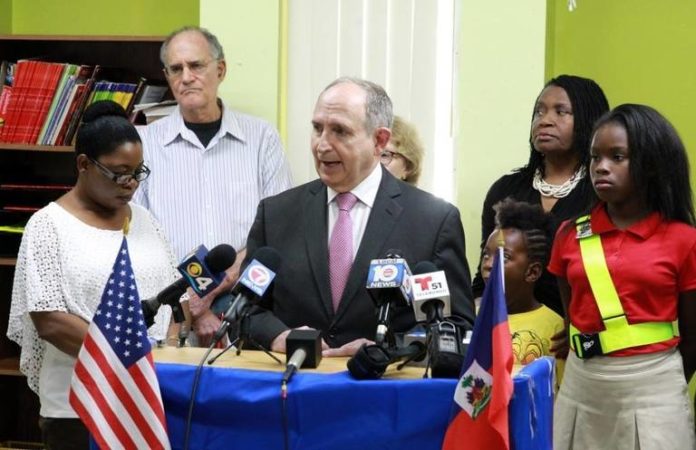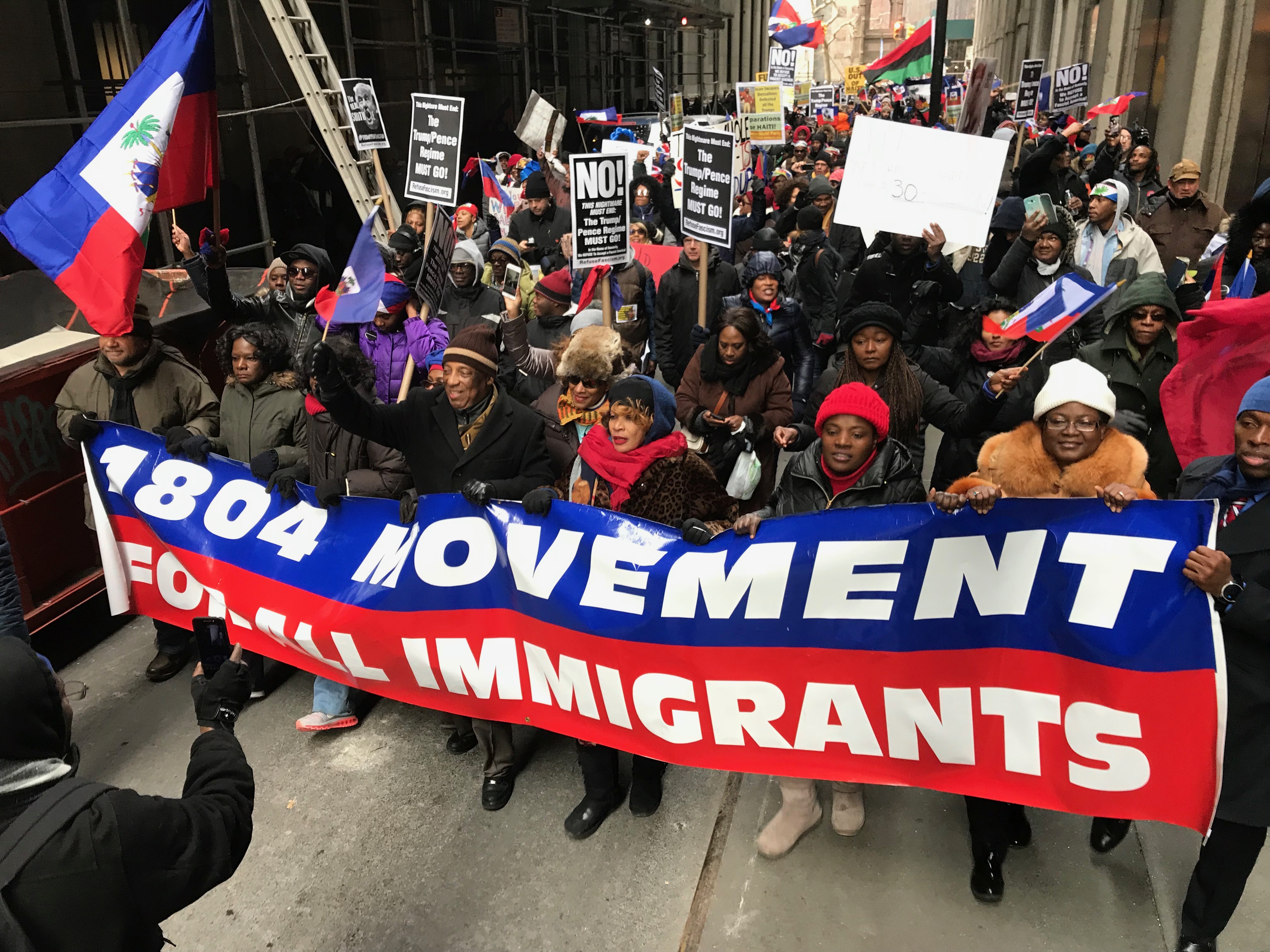
On Mar. 15, Haïti Liberté, a weekly newspaper with offices in Brooklyn, NY and Port-au-Prince, Haiti, the Family Action Network Movement (FANM) based in Miami, FL, and 10 Haitians currently living in the U.S. under Temporary Protected Status (TPS) filed suit against President Donald Trump and his top two Homeland Security officials for “an arbitrary and capricious agency action that was undertaken without statutory authority and without the procedures required by law” when they ended TPS for some 50,000 Haitians, effective Jul. 22, 2019.
The National Immigration Project of the National Lawyers Guild (NIPNLG) and the law firms of Kurzban, Kurzban, Weinger, Tetzeli and Pratt P.A., Mayer Brown and the Law Office of Clarel Cyriaque brought the suit on behalf of the dozen plaintiffs in the Eastern District of New York. Providing significant support was the Institute for Justice and Democracy in Haiti (IJDH), a Boston-based human rights nonprofit.
The suit alleges violations of law and the U.S. Constitution by Trump, Department of Homeland Security (DHS) Secretary Kirstjen Nielsen, and DHS Deputy Secretary Elaine C. Duke by seeking to operationalize the President’s racial animus toward Haitians, in spite of mandatory statutory criteria and procedures required to evaluate TPS for Haitians. A TPS cut-off would also adversely impact the lives of some 27,000 U.S. citizens who are the children of Haitians holding TPS since the January 2010 earthquake.
Make no mistake, Trump’s decision to terminate Haitian TPS is motivated by his repellent bias towards Haitians and other people of color.
In the past year, Trump has also ended TPS for Salvadorans and Nicaraguans. Three other lawsuits have been filed against Trump’s TPS terminations, including one in January by the venerable NAACP.
“Haiti is a textbook case for TPS on the facts, as editorial boards and political and civic leaders have recognized,” said the IJDH’s Steve Forester. “Getting to ‘no’ required DHS to ignore the reality on the ground and move the goalposts on the applicable criteria.”
In May 2017, the Trump administration had extended TPS for Haiti based on an assessment that “extraordinary” conditions persist in the country, including an ongoing housing shortage, severe cholera epidemic, lack of access to safe drinking water, an economic crisis including 40% unemployment, a population of 3.2 million who lack food security, and environmental risks including the October 2016 impact of Hurricane Matthew, the worst hurricane to hit Haiti in 52 years.
But six months later, on Nov. 20, 2017, Trump terminated Haitians’ TPS, giving them 18 months after their TPS expired in January 2018 to return to Haiti.
The Administration’s about-face on TPS exposed their discriminatory agenda to reduce the number of Haitians in the United States
“The Administration’s about-face on TPS exposed their discriminatory agenda to reduce the number of Haitians in the United States and their disregard for the safety, security, and due process rights of Haitians,” said Sejal Zota, legal director of the NIPNLG.
On Jan. 11, President Trump reportedly called Haiti a “shithole country,” after asking “why would we want any more Haitians?” He then demanded U.S. lawmakers “take them out” of a proposed bipartisan immigration deal. A few weeks earlier, he allegedly remarked that Haitians “all have AIDS,” a myth debunked 30 years ago.
Ira Kurzban, one of the foremost immigration attorneys in the U.S. and co-counsel in this suit, points to Trump’s racism as the nub of the problem. “The decisions of Trump, his staff, and the federal agencies disregard the administration’s own findings from months earlier and are nothing short of capricious, arbitrary, and an abuse of discretion,” said Kurzban, who worked closely with the late Rev. Gérard Jean-Juste in the 1980s and 1990s on behalf of Haitian refugees. “Make no mistake, Trump’s decision to terminate Haitian TPS is motivated by his repellent bias towards Haitians and other people of color.”
Beyond the charges of racism, the suit also brings forward six different claims of unlawful action on the part of defendants Trump, Nielsen, Duke, and the Department of Homeland Security.
Three of the individual Haitian TPS suit plaintiffs live in South Florida and seven in New York. One of the plaintiffs, Patrick Saget, has cerebral palsy and “is dependent on his U.S. citizen brother for his personal and medical care,” the suit explains. Another six of the plaintiffs have U.S. citizen children and “will face the heartrending decision whether to bring their children to a country with harsh and unsafe conditions or to leave them in the care of someone else for the sake of their own futures and physical safety,” the complaint continues.

Haïti Liberté risks losing one of its most important writers in New York, who has TPS. Meanwhile, the “decision to terminate TPS has had a significant adverse impact on FANM, severely taxing the agency and employees’ time and resources,” the suit concludes. FANM was formerly known as Fanm Ayisyen nan Miyami or Haitian Women in Miami.
“People are afraid to go to the supermarkets,” Marleine Bastien, FANM’s founder and executive director, told the Miami Herald. “Businesses are suffering …We’ve definitely seen an increase in the level of services requested from families as a result of the termination of TPS and it’s not only within the Haitian population. Immigrant families in general are suffering. Family members are keeping children away from schools because of the fear.”
After Trump’s “shithole” remark in January, Haïti Liberté joined with many other Haitian and North American organizations in the 1804 Movement for All Immigrants, which in six days organized a march of about 1,000 across the Brooklyn Bridge to a rally in front of the Trump Building at 40 Wall Street. One of the 1804 Movement’s demands is that all 300,000 TPS holders – Haitians, Salvadorans, Nicaraguans, Hondurans, and others – should receive permanent residency in the U.S.. Both Haïti Liberté and FANM are part of an even broader coalition of organizations planning a rally in front of the White House on May 19 to denounce Trump’s racist remarks and policies, including the TPS cut-off.
“The Haitian community is in the forefront of the resistance to Trump’s racism and anti-immigrant policies through this lawsuit and their marching in the streets,” said Berthony Dupont, Haïti Liberté’s director. “This is a pivotal moment in the struggle against Trump, and we are very fortunate to have such an eminent, brilliant, and committed team of lawyers fighting by our side. Although we know the weeks ahead will be very difficult, the tide is definitely turning against Trump’s xenophobia, and we trust the U.S. courts will see the Haitian TPS cut-off as the illegal, heartless, and reactionary act that it is.”
A full copy of the suit is available at www.nationalimmigrationproject.org.











[…] d’action familiale basé à Miami (FANM) et 10 autres Haïtiens vivant aux États-Unis à Sue la première administration Trump pour avoir franchi l’étape «arbitraire et capricieuse» de mettre fin au statut temporaire […]
[…] with the Miami-based Family Action Network Movement (FANM) and 10 other Haitians living in the U.S. to sue the first Trump administration for taking the “arbitrary and capricious” step of terminating the Temporary Protected Status […]
[…] the move was effectively stopped by several court rulings, most importantly Saget et al. v. Trump, the 2018 suit brought by Haïti Liberté, the Family Action Network Movement (FANM), and nine TPS recipients in federal […]
[…] the move was effectively stopped by several court rulings, most importantly Saget et al. v. Trump, the 2018 suit brought by Haïti Liberté, the Family Action Network Movement (FANM), and nine TPS recipients in federal […]